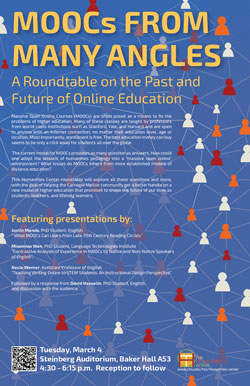MOOCs From Many Angles
A Roundtable on the Past and Future of Online Education

 Massive Open Online Courses (MOOCs) are often posed as a means to fix the problems of higher education. Many of these classes are taught by professors from world-class institutions such as Stanford, Yale, and Harvard and are open to anyone with an Internet connection, no matter their education level, age or location. Most importantly, enrollment is free. The best education money can buy seems to be only a click away for students all over the globe.
Massive Open Online Courses (MOOCs) are often posed as a means to fix the problems of higher education. Many of these classes are taught by professors from world-class institutions such as Stanford, Yale, and Harvard and are open to anyone with an Internet connection, no matter their education level, age or location. Most importantly, enrollment is free. The best education money can buy seems to be only a click away for students all over the globe.
Not surprisingly, this new model of higher education has generated great controversy for the teachers and students in more traditional programs and universities. The current model for MOOCs provokes as many question as answers. Should MOOC students be eligible for college credit? How many students actually finish the courses in which they they enroll? Do students actually learn what these courses promise? How good could a free college education actually be? How could one adopt the lessons of humanities pedagogy into a "massive open online" environment? What issues do MOOCs inherit from more established models of distance education? How do we prevent MOOCs from evolving into a system that rewards here only a few famous lecturers for their teaching labor while the rest just grade homework?
This Humanities Center roundtable will explore all these questions and more, with the goal of helping the Carnegie Mellon community get a better handle on a new model of higher education that promises to shape the future of our lives as students, teachers, and lifelong learners.
Featuring presentations by:
Justin Mando, PhD Student, English
"What MOOCs Can Learn from Late-19th Century Reading Circles."
Miaomiao Wen, PhD Student, Language Technology Institute
"Contrastive Analysis of Experience in MOOCs by Native and Non-Native Speakers of English".
Necia Werner, Assistant Professor of English
"Teaching Writing Online to STEM Students: An Instructional Design Perspective?"
Followed by a response from David Haeselin, PhD Student, English, and discussion with the audience.
